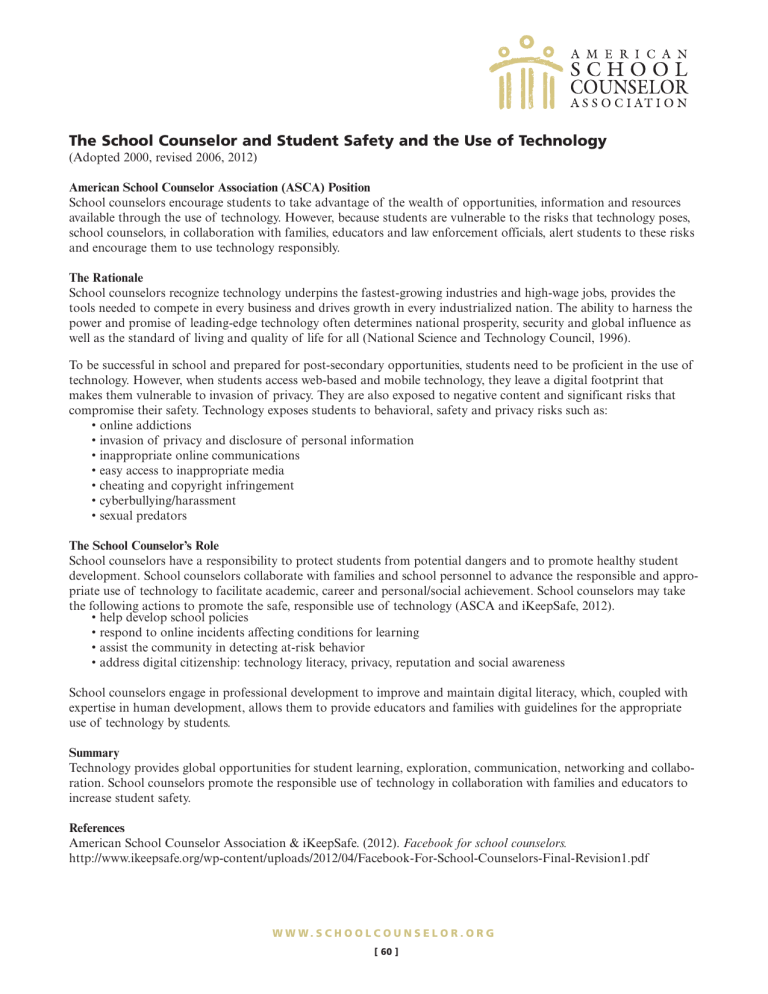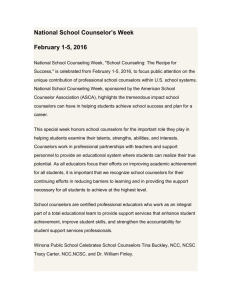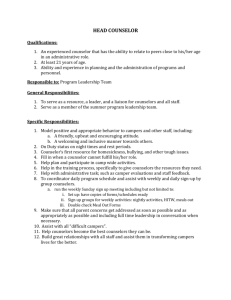The School Counselor and Student Safety and the Use of...

The School Counselor and Student Safety and the Use of Technology
(Adopted 2000, revised 2006, 2012)
American School Counselor Association (ASCA) Position
School counselors encourage students to take advantage of the wealth of opportunities, information and resources available through the use of technology. However, because students are vulnerable to the risks that technology poses, school counselors, in collaboration with families, educators and law enforcement officials, alert students to these risks and encourage them to use technology responsibly.
The Rationale
School counselors recognize technology underpins the fastest-growing industries and high-wage jobs, provides the tools needed to compete in every business and drives growth in every industrialized nation. The ability to harness the power and promise of leading-edge technology often determines national prosperity, security and global influence as well as the standard of living and quality of life for all (National Science and Technology Council, 1996).
To be successful in school and prepared for post-secondary opportunities, students need to be proficient in the use of technology. However, when students access web-based and mobile technology, they leave a digital footprint that makes them vulnerable to invasion of privacy. They are also exposed to negative content and significant risks that compromise their safety. Technology exposes students to behavioral, safety and privacy risks such as:
• online addictions
• invasion of privacy and disclosure of personal information
• inappropriate online communications
• easy access to inappropriate media
• cheating and copyright infringement
• cyberbullying/harassment
• sexual predators
The School Counselor’s Role
School counselors have a responsibility to protect students from potential dangers and to promote healthy student development. School counselors collaborate with families and school personnel to advance the responsible and appropriate use of technology to facilitate academic, career and personal/social achievement. School counselors may take the following actions to promote the safe, responsible use of technology (ASCA and iKeepSafe, 2012).
• help develop school policies
• respond to online incidents affecting conditions for learning
• assist the community in detecting at-risk behavior
• address digital citizenship: technology literacy, privacy, reputation and social awareness
School counselors engage in professional development to improve and maintain digital literacy, which, coupled with expertise in human development, allows them to provide educators and families with guidelines for the appropriate use of technology by students.
Summary
Technology provides global opportunities for student learning, exploration, communication, networking and collaboration. School counselors promote the responsible use of technology in collaboration with families and educators to increase student safety.
References
American School Counselor Association & iKeepSafe. (2012). Facebook for school counselors.
http://www.ikeepsafe.org/wp-content/uploads/2012/04/Facebook-For-School-Counselors-Final-Revision1.pdf
W W W . S C H O O L C O U N S E L O R . O R G
[ 60 ]
International Society for Technology in Education. (2008). ISTE standards - teachers. Retrieved from http://www.iste.org/standards/iste-standards/standards-for-teachers
National Science and Technology Council. (1996). Accomplishments of the National Science and Technology Council.
Retrieved from http://www.ostp.gov/NSTC/html/1996_Accomplishments.html
W W W . S C H O O L C O U N S E L O R . O R G
[ 61 ]




